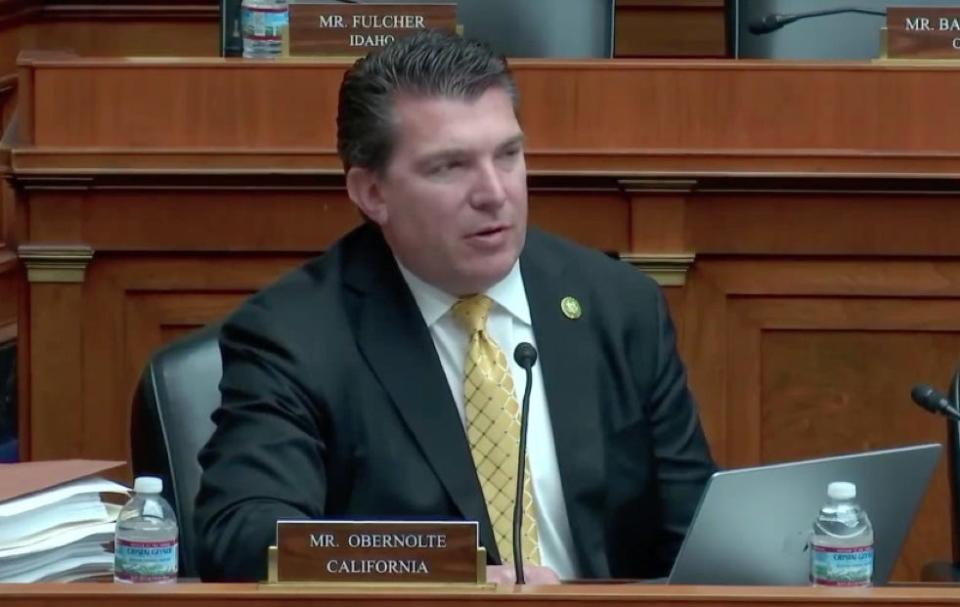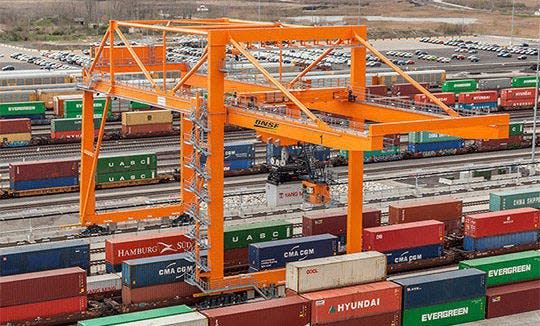Rep. Jay Obernolte opposes state rule that would halt BNSF’s railway project in Barstow
Rep. Jay Obernolte recently led 73 of his colleagues in a letter opposing the Environmental Protection Agency granting a waiver to the California Air Resources Board for its regulation rule requiring zero-emission, all-electric locomotives by 2035.
Construction of Burlington Northern Santa Fe's $1.5 billion state-of-the-art Barstow International Gateway rail facility is in jeopardy of being halted by the state rule, according to the Daily Press.

The state’s rule went into effect on Jan. 1, 2024, but the California Air Resources Board must obtain approval from the Environmental Protection Agency before it can begin fully enforcing the rule.
If the Environmental Protection Agency were to grant the waiver, it would also have harmful ramifications across the country and on jobs in California’s 23rd Congressional District, as well as counterproductively increasing greenhouse gas emissions rather than decreasing them, Obernolte’s office said.
On May 15, Environmental Protection Agency Administrator Michael Regan appeared before the House Energy and Commerce Environment, Manufacturing and Critical Minerals Subcommittee where Rep. Obernolte took the opportunity to encourage him to deny the California waiver.
To convey the importance of this issue to the residents of California's 23rd Congressional District, Congressman Obernolte delivered nearly 2,000 letters from constituents, agencies and organizations to the administrator expressing their concerns that the waiver would have on the economy and national supply chains.
“Nearly every American desires fewer emissions and a cleaner environment, but CARB’s nonsensical regulations on locomotives will not accomplish that,” Obernolte said. “According to the EPA’s own analysis in 2021, Medium- and Heavy-Duty Trucks contributed 23% of total transportation greenhouse gas emissions, while rail only contributed 2%.”
Obernolte added, “That instead of working to shut down vital infrastructure like BNSF’s Barstow International Gateway, CARB and the EPA should be supporting its construction to strengthen our ability to efficiently get cargo out of the ports of Los Angeles and Long Beach by rail instead of on trucks that statistically emit far more greenhouse gasses.”

The letter from Congress stated that presently, there are no commercially available freight locomotives that could comply with the zero-emissions requirements of the regulation.
According to the Association of American Railroads’ recent response to a Request for Information from the U.S. Department of Energy on Rail Sector Decarbonization, one would need a battery capacity of 80 to 100 MWh to fully replace a diesel engine in a locomotive; however, the largest batteries being built for use in North America today hold less than 10 MWh of energy, the letter stated.
Combined with supply chain difficulties in acquiring the technology and the delays associated with obtaining the requisite environmental permits for the support infrastructure, it is unlikely that railroads would be able to comply with the regulation in the timelines envisioned, according to the letter.
The letter also draws attention to the 4,500-acre state-of-the-art integrated rail facility in Barstow.
“This type of project, which will reduce highway and port congestion while maximizing rail and freight distribution efficiency regionally and across the U.S. supply chain, is in jeopardy if EPA grants authorization for the regulation,” the letter stated.
Barstow International Gateway
The Barstow International Gateway will provide up to 20,000 direct and indirect jobs in our community. This project will allow the direct transfer of containers from ships at the ports of Los Angeles and Long Beach to Barstow.
If the California Air Resources Board rule goes into full effect, this project would be canceled completely, which goes against both CARB and the EPA’s goals, as the gateway project would significantly reduce port and highway congestion, Obernolte said.
By distributing cargo through an expanded rail system, congestion, traffic, and greenhouse gas emissions will be reduced throughout the Los Angeles Basin and the Inland Empire.
In April, Barstow city leaders traveled to Sacramento to gain legislative support for the construction of Burlington Northern Santa Fe's Barstow International Gateway project.
Daily Press reporter Rene Ray De La Cruz may be reached at RDeLaCruz@VVDailyPress.com. Follow him on X @DP_ReneDeLaCruz
This article originally appeared on Victorville Daily Press: Rep. Obernolte opposes state rule that would halt BNSF’s Barstow project

